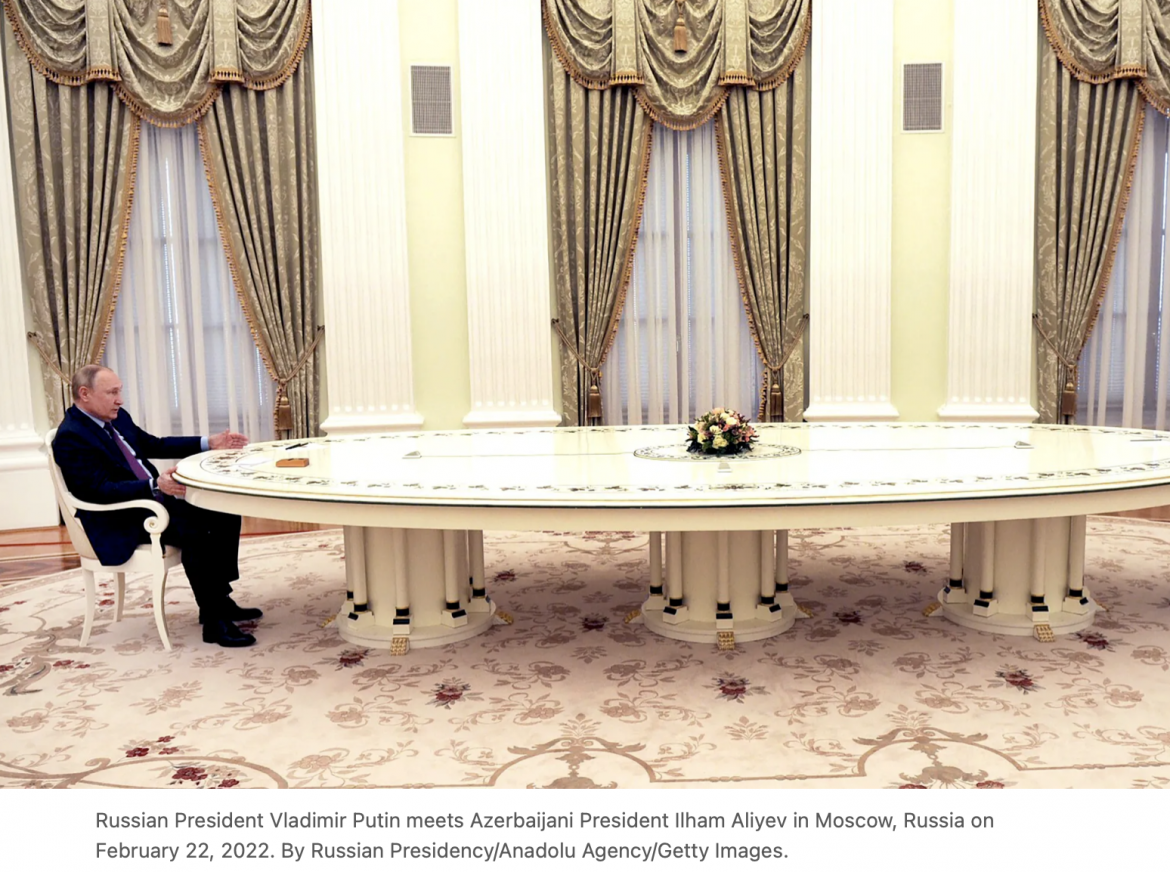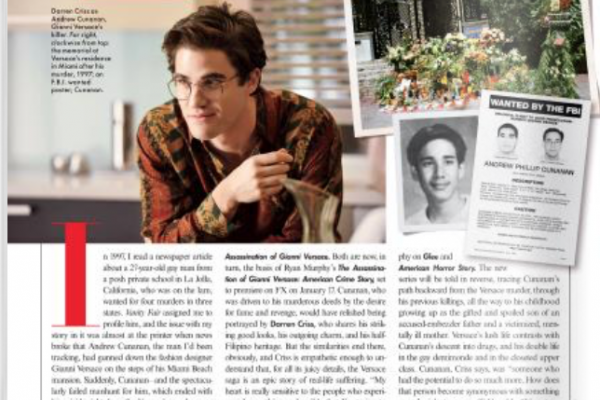Elected to bring order to Russia, Putin has plunged it into chaos. Revisiting her investigation into his origins, the author reveals how the former KGB officer’s fixed obsessions—and the West’s inability to confront him—set the stage for the catastrophe in Ukraine.
By Maureen Orth
March 4, 2022

Today, the world sees Vladimir Putin from a distance, isolated at the end of a very long table. When I first met him, in September 2000, he was at a very different table, in a private room at New York’s 21 Club, at a dinner hosted by Tom Brokaw for 20 or so media luminaries. Brokaw had interviewed the recently elected Russian president for NBC a few months earlier. I was invited because I had just closed a lengthy profile of Putin for Vanity Fair, and also because my late husband, Tim Russert, was the anchor of NBC’s Meet the Press.
The number one topic was why Putin had not interrupted his vacation when the Russian Kursk submarine sank, killing all 118 crew members. By then, Russians were fed up with years of his predecessor Boris Yeltsin’s often drunken antics, and Putin had quickly sought to impose order and restore government control over two media empires that were ruled by oligarchs he considered too independent. He was already making moves to eventually crush them. He’d also installed ruthless former KGB officials in key geographic “super zones” to supervise the unruly Russian parliament. Putin himself had won the presidency in no small part by promising to brutally eliminate separatists who had fought back in Chechnya, not entirely dissimilar to how the Ukrainians are fighting back today.
My head stuffed with facts about Russia after months of reporting out my Vanity Fair story, I immediately raised my hand when Brokaw said Putin would answer some questions. We had a back and forth about press freedoms that ended with Putin finally saying, “Who are you? Where are you from? Why did you not come to me personally to ask me these questions?” I pointed to his spokesman at the time, Alexey Gromov, sitting nearby. “I have been trying for four months to interview you and he always said no.”
A few months earlier, in June 2000, I had been present when President Bill Clinton, Secretary of State Madeleine Albright, and Clinton’s chief of staff, John Podesta, met Putin for the first time for bilateral talks on U.S.-Russian relations. The confab took place in the grand St. George Hall of the Kremlin, which had been freshly refurbished in Tsarist splendor. Clinton, who was buddies with Yeltsin, began a smiley, rambling talk that appeared mostly content-free. Meanwhile, the unsmiling Putin, who was very much prepared, sat by himself at his own table, dressed in a yellow-beige suit that matched both his complexion and demeanor. As Clinton went on, Putin, who slumped inattentively in his chair, began to drum his fingertips on the tabletop. Then they all retired to a smaller room with a conventional conference table, where some of us in the press were allowed to glimpse Putin presenting a bouquet of flowers to the American ambassador on his birthday. Later, at a carefully vetted press conference, Western journalists and Russian journalists sat apart and each group was allowed exactly four questions that had been submitted and chosen beforehand.
Going to St. Petersburg a few days later to research Putin’s origins, I learned about two qualities that defined him: the price he put on loyalty, and his reverence for the motherland, which was fueled by a deep resentment for the humiliation that he and his close circle of former KGB agents believed had been visited upon them by the U.S. and the West after the fall of the Soviet Union.
“Shock therapy” was the informal name of U.S. policy toward Russia in the 1990s. It was perpetrated by a group of Harvard professors led by Jeffrey Sachs and Andrei Shleifer, who were mentored by Larry Summers. Vice President Al Gore oversaw its implementation. The idea was to quickly replace the state-run economy with a free market one, but in practice the sudden removal of price controls and subsidies sparked hyperinflation, wiping out the savings of millions of ordinary Russians, and even causing starvation in some places.
I witnessed the hardship myself when I made my first reporting trip to Russia for Vanity Fair, in 1994, to chronicle the rise of the übernationalist politician and white supremacist Vladimir Zhirinovsky, who I discovered had been secretly sponsored by the ever-powerful intelligence services to siphon votes off from Yeltsin. Zhirinovsky sat down with me in front of a map of the world and circled the old Soviet empire, then blithely drew an arrow straight down through Iran and wrote across 11 time zones, “РОССИЯ”—Russia. “This belongs to us,” he said. “The U.S. can have North and South America, Europe can have Africa.”
When the Soviet Union fell, the KGB was never dissolved, just halved into domestic and foreign branches. The domestic branch was rechristened the FSB. “Putin is not a democrat,” I was told in St Petersburg. “Do you know what dermocracy is in Russia? In Russian, dermo means crap.” I also learned that Putin, the only surviving child of working-class parents, came from a family that “hates democracy.” Indeed, Putin’s grandfather worked as a cook for Stalin. In his youth, the slight, 135-pound Volodya first gained recognition as a judo champion, renowned among his teammates for his ability to throw men twice his weight through cunning and surprise.
When his parents won a car in a state lottery, they could have sold it and lived off the proceeds for several years. Instead, Putin was one of the only university students to have his own car as he quietly campaigned to be chosen for the KGB, where, tellingly, he did not rise beyond rank of lieutenant colonel. But his loyalty and attention to detail while serving the reform-minded but allegedly corrupt mayor of St. Petersburg, Anatoly Sobchak, earned him the nickname “the Gray Cardinal.” It also put him on Yeltsin’s radar.
When Sobchak faked a heart attack as prosecutors were closing in on him, it was Putin who got him spirited out of the hospital and onto a jet to Paris. Shortly after, Putin began his meteoric rise as Yeltsin’s handpicked successor, becoming the head of the KGB and then serving as prime minister before Yeltsin dramatically resigned on New Year’s Eve 1999. He won his first term as president in part thanks to a carefully calibrated P.R. campaign that portrayed him as a physically strong and powerful patriot. Years of shirtless horseback-riding and tiger-tagging ensued, as did the murders of journalists and dissidents. Yet we in the U.S. kept on looking the other way.
Obviously, appearances have always counted greatly to Putin and to Russia itself, to assuage its nagging sense of inferiority vis-à-vis the West. During the darkest days of Communism and the Cold War, no matter how many millions were suffering or starving inside the USSR, the Soviet Union always prized and promoted enterprises it could show off on the world stage: classical music and ballet, the circus, chess, the space program, Olympic athletes, stamps. All were part of the country’s first line of propaganda, side by side with its nuclear power and weaponry. So today, for Russia to once again be shunned as a pariah state, stripped of its ability to show its stuff on a global scale, not even able to compete in the Eurovision Song Contest, the ruble in free fall, its economy soon to be in tatters from sanctions, one wonders if Putin, who has been personally stripped of his own international judo honors, is too far gone now to even wonder if it was a mistake to move so precipitously on Ukraine.
With hindsight, it’s a no-brainer to say that the U.S. should have challenged Putin long before things got this out of hand. But 9/11 happened and we needed his air space. George W. Bush looked into his eyes and saw “his soul.” The Obama administration never fought back in any meaningful way when he threw USAID out of Russia in 2012 (he’d kicked the Peace Corps out a decade earlier), annexed Crimea in 2014, and invaded Syria in 2015.
Yet, for some longtime Russia hands, including Susan Reichle, a USAID director in Moscow from 1999 to 2003, the current catastrophe, even as Russia’s invasion levels Ukraine and brings untold bloodshed and suffering on millions, brings a measure of hope and optimism, even though there is no formal way to dislodge Putin. (Even the old Soviet Politburo could technically vote to oust its premier.) “The world uniting now against him is huge. The protests inside Russia now are real—people are not happy with him waging this war. Too much blood and treasure has already been lost because of this mad man. It is definitely going to weaken him.” Reichle says.
As they say in Russia, hope dies last. The other day I googled Sergei Roldugin,who was a sweet-natured cellist from St. Petersburg’s Mariinsky Theatre when I interviewed him for my story. Roldugin, Putin’s closest friend and godfather of his eldest daughter, told me in 2000 that Putin emphatically assured him then that he absolutely did not take bribes. Today, Roldugin is one of Russia’s sanctioned oligarchs, alleged to have helped launder $2 billion in cash for Putin. I wonder how far down the table he sits.



No Comments